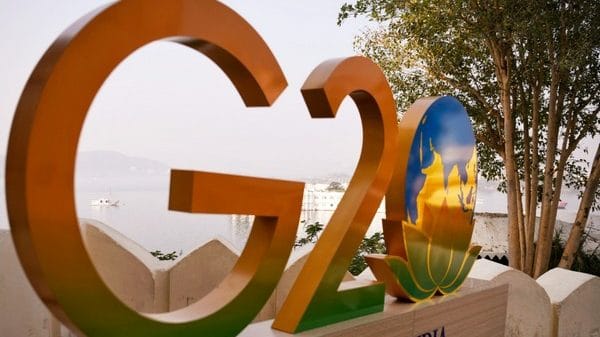India’s presidency of the G20 is a pivotal moment in its international standing. India has a vital role to play in key global challenges, from economic sluggishness to regional strife. However, it has much more to offer in terms of a philosophy toward humanity’s common future and way of life. This is not just a global leadership moment but a vishwa guru (world leader) one.
So, it’s good to see India using phrases like “let us join together” to make this presidency about “healing, harmony, and hope”. It reflects not just idealism but genuineness. There is no doubt that growing polarisation and clashes of ideologies can be overcome through the “lasting appeal of so many spiritual traditions that advocate the fundamental one-ness of us all,” as Prime Minister Narendra Modi puts it.
Voice of the developing world
G20, or the Group of Twenty, is an organisation of 19 countries and the European Union with roots in the 1997-1999 Asian financial crisis. The G7 convened a meeting of its finance ministers and central bank governors to find a solution to the meltdown. That was the first time the grouping was elevated to the summit level.
Since then, it has grown into the G20 – representing 85 per cent of global GDP, 75 per cent of global trade, and two-third of the world’s population. It has widened its ambit to include dealing with humanitarian crises, natural disasters, climate change, health, and gender issues among others.
Given all that it represents, the G20 has the power to shape the future. The question is, what should that future look like. This is where India’s spiritualism and philosophy come in. The theme for the presidency is heartening: “One Earth, One Family, One Future.” It’s also important in terms of the stand India has taken about the global south becoming the voice of the developing world.
This is a world struggling with post-Covid economic challenges, the conflict in Ukraine, soaring inflation, dipping growth, and various scarcities, from fuel to food. This is India’s opportunity to take on the role of peacemaker, leveraging its G20 presidency. Perhaps the PM realises it. “The onus of creating a new world order for the post-Covid period lies on our shoulders. I am confident that next year when the G20 meets in the holy land of Buddha and Gandhi, we will all agree to convey a strong message of peace to the world,” he said.
To that end, India has shown great wisdom by pushing for a global consensus on stable supply chains for food and fertilisers as well as energy.
Also read: Mumbai got tacky cut-and-paste makeover for G20 delegates. What it needs is proper facelift
Oneness of humanity
There are two other critical areas for which India should use its G20 presidency: debt relief and climate action. The global debt crisis has been in the news for a while. A worryingly large number of poor countries are struggling with huge debt. The G20 has a mechanism to help, but it needs to move faster. As far as climate action goes, the key to success is climate finance.
It would undoubtedly require a large sum of money to enable the transition to green technologies in sectors ranging from power generation to transportation.
Both these areas are opportunities for India to show leadership. None of these crises are applicable to one nation or group. What affects one, affects us all.
It all boils down to the oneness of humanity, which fits perfectly with India’s spiritual traditions. That’s why, while unveiling the logo of India’s G20 presidency on 8 November, Modi underscored the mantra of vasudhaiva kutumbakam (the world is one family).
He said that Advaita is the philosophy of the unity of all life and that it should pave the path towards the solution of our global challenges. He is perhaps the first Indian prime minister to offer this philosophy as a solution to the world’s dilemmas.
Actually, the idea of humanity as one is not part of the Hindu religion alone. It is widely mentioned by other religions too. For instance, the Holy Quran says God belongs to all. That is perhaps why Modi used the words “so many spiritual traditions” instead of an exclusivist “our-way-is-the-only-way” language.
So, if the world is one family, the concerns of each member must be resolved, and that is best done by reconciling their interests. This is not easy, of course. But the growing respect the world has for India, its inclusivist traditions, and its philosophy that has survived and thrived through the millennia puts us in a unique position. The world is looking to India for solutions not just for the ‘brick-and-mortar’ problems but also to bridge the schisms in our minds and hearts.
This is, truly, our vishwa guru moment. It’s the one India should seize.
Asha Jadeja is a Silicon Valley-based entrepreneur, venture capitalist, philanthropist and a ‘change agent’. She tweets @ashajadeja325. Views are personal.
(Edited by Tarannum Khan)






